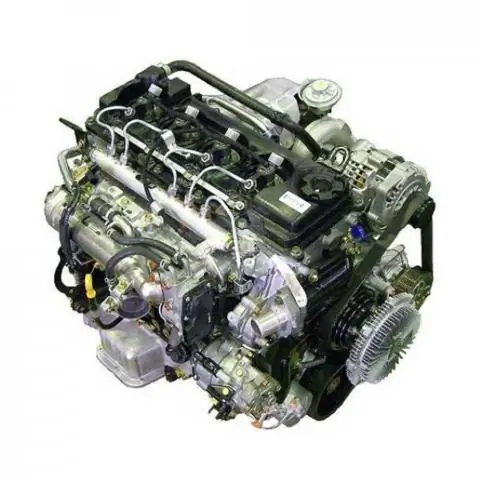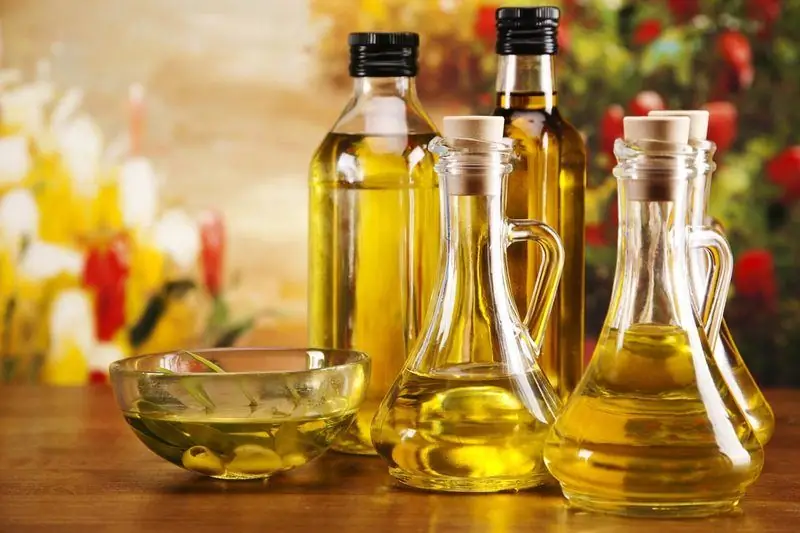
Table of contents:
- Author Bailey Albertson albertson@usefultipsdiy.com.
- Public 2023-12-17 12:53.
- Last modified 2025-01-23 12:41.
We independently adjust oil pressure in ZMZ engines

Any internal combustion engine needs lubrication of rubbing parts, and engines of the ZMZ family are no exception in this regard. Without constant lubrication, such an engine will work for a maximum of an hour, after which it will simply jam. Its cylinders and valves will be seriously damaged, and it will be extremely difficult to repair such damage. Therefore, the oil pressure in the ZMZ engine is the most important indicator that the car owner must carefully monitor. But on domestic cars with ZMZ engines, the oil pressure very often disappears. Let's try to figure out for what reasons this happens and how it can be eliminated.
Content
-
1 About ZMZ engines
1.1 Norm of oil pressure in ZMZ engines
-
2 Checking the oil pressure
2.1 Signs of low oil pressure
-
3 Reasons for lowering oil pressure and their elimination
- 3.1 Sharp drop in engine oil
- 3.2 Gradual drop in oil pressure
- 3.3 Video: looking for the cause of the drop in oil pressure in the ZMZ engine
About ZMZ engines
Before talking about oil pressure, it is worth introducing the reader to the engine itself. ZMZ engines are produced by the Zavolzhsky Motor Plant. They have 4 cylinders and 16 valves.

ZMZ engines are produced by the Zavolzhsky Motor Plant
These motors are installed on Volga, UAZ, GAZelle, Sobol cars. The family includes motors ZMZ-402, 405, 406, 409, 515 and a number of their special modifications. ZMZ engines have their advantages:
- good maintainability;
- simplicity of the device;
- low demands on the quality of fuel.
But there are also disadvantages:
- the timing drive is very cumbersome;
- the reliability of the chain tensioner in the timing drive leaves much to be desired;
- The piston rings are of an archaic design. As a result, large lubricant losses and power drops are observed;
- the overall quality of casting and heat treatment of individual engine parts is getting worse every year.
Oil pressure rate in ZMZ engines
The pressure in the lubrication system is measured only when the engine is warm and idling. The crankshaft rotation speed at the time of measurement should not exceed 900 rpm. Here are the ideal oil pressure rates:
- for motors ZMZ 406 and 409, a pressure of 1 kgf / cm² is considered ideal;
- for motors ZMZ 402, 405 and 515, the ideal pressure is 0.8 kgf / cm².
It should be noted here that the highest pressure in the lubrication system of the ZMZ engine can theoretically reach 6.2 kgf / cm², but in practice this almost never happens. As soon as the oil pressure reaches 5 kgf / cm², the pressure reducing valve in the motor opens and the excess oil goes back to the oil pump. So the oil can reach the critical level only in one case: if the pressure reducing valve is stuck in the closed position, and this happens extremely rarely.
Checking the oil pressure
The oil pressure is displayed on the car dashboard. The problem is that it is far from always possible to trust these figures, since the devices can also fail and start giving incorrect readings. It often happens that the oil pressure is normal, but the instruments show that there is no pressure at all. For this reason, it is advisable to simply inspect the vehicle. Here's how it's done:
-
first, you should look under the hood and inspect the engine for oil drips, special attention should be paid to the engine crankcase: it is clean in serviceable engines;

Oil leaks on the crankcase The decrease in oil pressure occurs due to a leak through the crankcase
- inspect the oil filter. If streaks are visible around it, then the filter gasket is worn out. Or the second option: the filter is simply loosely twisted, which led to a leak. Change the oil gasket and screw the filter tightly. This is usually enough to increase the lubricant pressure;
- if the previous measures were useless, you should check the lubricant level in the motor using a dipstick;
- if the oil level is within the normal range, the oil pressure sensors should be checked, since the problem is most likely in them.
If all of the above measures did not work, and the cause of the low pressure was not identified, the last way remains: use an additional pressure gauge.
- The oil pressure sensor is unscrewed from its regular place (you can check the location of this sensor in the car's operating instructions).
-
A special adapter is screwed in place of the sensor. An additional working manometer is screwed into the adapter.

Additional pressure gauge An additional pressure gauge is screwed into place of the standard oil sensor
- The car engine starts and warms up for 20 minutes. After that, readings are taken from the pressure gauge when the engine is idling and at a crankshaft speed not exceeding 900 rpm. If the figures obtained correspond to the standards given above, everything is in order with the oil pressure. If not, the lubrication system needs repair.
Signs of a drop in oil pressure
If the oil pressure in the engine drops sharply, it is impossible not to notice it. Here are the main signs that something is wrong with the engine lubrication system:
- the motor began to overheat quickly. At the same time, the exhaust gas becomes larger, and the exhaust is black, which is especially noticeable when the car picks up speed;
- bearings and other parts subject to intense friction began to wear out very quickly;
- the engine began to pound and vibrate. The explanation is simple: there is little lubrication in the motor, the rubbing parts gradually wear out and the gaps between them increase. In the end, the details become loose, begin to knock and vibrate;
- the smell of burning in the cabin. If the oil pressure is reduced, it begins to oxidize and burns out. And the driver smells the combustion products.
Reasons for lowering oil pressure and their elimination
First of all, it should be noted that a drop in oil pressure is a malfunction, which is a common "disease" of all engines of the ZMZ family, regardless of their model. There are no special nuances associated with this malfunction and characteristic of any particular engine from the ZMZ family. For this reason, below we will consider the reasons for the drop in oil pressure in the ZMZ-409 engine, which is currently the most popular in our country. Here it should be said that the most common reason for a drop in oil pressure is an incorrect viscosity coefficient, aka SAE. Due to this driver error, the engine oil can become too thin in hot weather. Or vice versa, in severe frost, it can quickly thicken. Therefore, before looking for a problem in the engine, the car owner should ask himself a simple question: did I fill in the oil?
A sharp drop in engine oil
If the oil pressure in the ZMZ engine drops sharply, then this can happen for two reasons:
-
the pressure relief valve in the oil pump does not close. If the driver rarely changes the oil, it depletes its resource. Sludge and dirt appear in it, which can get into the pressure reducing valve, causing it to jam. Solution: draining the old oil, thoroughly cleaning the pressure reducing valve, flushing the lubrication system with kerosene, filling with new oil with the correct viscosity grade;

Pressure reducing valve If the pressure relief valve is constantly open, the oil pressure drops sharply
-
the drive shaft in the oil pump has broken. Both the shaft itself and individual teeth on its gear can break. Both the first and the second will lead to pump failure and a sharp drop in oil pressure. Solution: replace the oil pump drive. Moreover, the drive will have to be bought as a whole, since it is currently not possible to find a shaft for ZMZ oil pumps in free sale.

Oil pump drive shaft If the oil pump shaft breaks down, the pressure may drop sharply
It should be noted here that the above breakdowns are quite rare. For this to happen, the driver must absolutely "start" the engine and not change the oil in it for years, or use a lubricant that is not suitable in terms of viscosity for a long time.
Gradual drop in oil pressure
This problem is very common in all engines of the ZMZ family, without exception. It can occur due to many factors: these are design errors, which were mentioned above, and improper maintenance, and natural wear of parts, and much more. Here are the most common causes of a gradual drop in oil pressure:
-
oil filter wear. Gazelle drivers strongly recommend changing these filters every 5-6 thousand km, and changing the oil every 10 thousand km. If this is not done, a dirty sludge forms in the oil, no matter how good it is, which gradually clogs the oil filter. And the driver at this moment observes the above signs of a drop in oil pressure;

Oil filter ZMZ Oil filters on ZMZ engines should be changed as often as possible
- general engine wear. First of all, this applies to the intermediate shaft, on which the main pressure losses occur. This is due to wear on the shaft bearing sleeves. The hydraulic chain tensioner can also wear out, which also does not differ in durability. In addition, the cylinder head itself and the camshafts are often worn out. With the slightest wear in this system, the pressure begins to drop, and the oil consumption gradually increases. A worn oil pump, which is simply not able to supply a sufficient amount of lubricant to the motor, can also cause a pressure drop. And finally, hydraulic lifters on the valves can fail, which also reduces the lubricant pressure. There is only one solution to all of the above problems: engine overhaul;
-
wear of the pressure reducing valve. There is a spring in the pressure reducing valve that can weaken over time. As a result, part of the oil goes back to the oil pump, which leads to a decrease in oil pressure. Some motorists solve the problem simply: they put a couple of small washers under the spring in the valve. But this, as you might guess, is only a temporary measure. And the only correct solution is to replace the pressure reducing valve with a new one (it will not work to buy a new spring for the valve - they are not sold separately);

Reducing valve device The spring is the main component of the pressure reducing valve in the ZMZ motor
- oil cooler leak. Radiators in which the oil is cooled are found on many cars with ZMZ engines. However, these radiators are used extremely rarely, as their quality leaves much to be desired. Of particular note is the oil cooler valve. This tap is constantly leaking. Solution: refuse to use an oil cooler, because with the correct selection of oil, the need for this device simply disappears. Or the second option: put a high-quality tap on the radiator (preferably a ball valve, made in Germany, but by no means Chinese).
Video: looking for the cause of the drop in oil pressure in the ZMZ engine
So, there are many reasons causing a drop in oil pressure in engines of the ZMZ family. Some of them are the result of "congenital diseases" of this motor. Others are the result of the driver's own carelessness, and still others are the result of banal mechanical wear and tear. Most of these problems can be eliminated on their own, but the overhaul of the motor will have to be entrusted to a qualified specialist.
Recommended:
How To Remove Engine Oil From Clothes, How To Remove Stains From It From Fabric

Features of the fight against fresh and old stains from engine oil. Ways to solve the problem for different types of fabrics. Step by step instructions. Video
How And How To Wash Your Hands From Oil Mushrooms And Others, Including After Cleaning

What tools can you use to wash your hands from mushrooms, how to remove traces of oils without damaging your skin. Instructions. Video
Which Automatic Blood Pressure Monitor To Choose: A Review Of The Best Models + How To Measure Pressure Correctly And On Which Hand

What is the best tonometer to choose - rating, reviews. How to correctly measure blood pressure with an automatic tonometer, on which hand
How To Train A Cat Or Cat To A Scratching Post, Including In The Form Of A House: Features Of Training Kittens And Adult Animals, Recommendations And Reviews

Why cats need to sharpen their claws. How to draw your pet's attention to a device. What to do if your cat doesn't want to use the scratching post
Why You Can't Fry In Unrefined Oil, Including Sunflower And Olive Oil

Is it possible to fry in unrefined oil: objective reasons and myths
